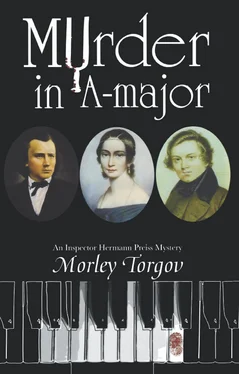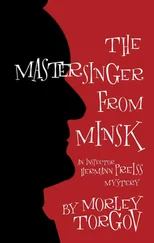Morley Torgov - Murder in A-Major
Здесь есть возможность читать онлайн «Morley Torgov - Murder in A-Major» весь текст электронной книги совершенно бесплатно (целиком полную версию без сокращений). В некоторых случаях можно слушать аудио, скачать через торрент в формате fb2 и присутствует краткое содержание. Жанр: Исторический детектив, на английском языке. Описание произведения, (предисловие) а так же отзывы посетителей доступны на портале библиотеки ЛибКат.
- Название:Murder in A-Major
- Автор:
- Жанр:
- Год:неизвестен
- ISBN:нет данных
- Рейтинг книги:5 / 5. Голосов: 1
-
Избранное:Добавить в избранное
- Отзывы:
-
Ваша оценка:
- 100
- 1
- 2
- 3
- 4
- 5
Murder in A-Major: краткое содержание, описание и аннотация
Предлагаем к чтению аннотацию, описание, краткое содержание или предисловие (зависит от того, что написал сам автор книги «Murder in A-Major»). Если вы не нашли необходимую информацию о книге — напишите в комментариях, мы постараемся отыскать её.
Murder in A-Major — читать онлайн бесплатно полную книгу (весь текст) целиком
Ниже представлен текст книги, разбитый по страницам. Система сохранения места последней прочитанной страницы, позволяет с удобством читать онлайн бесплатно книгу «Murder in A-Major», без необходимости каждый раз заново искать на чём Вы остановились. Поставьте закладку, и сможете в любой момент перейти на страницу, на которой закончили чтение.
Интервал:
Закладка:
Morley Torgov
Murder in A-Major
Prologue
Madam Vronsky, my piano teacher, politely but firmly removes my hands from the keyboard. Gently she closes the tattered volume of music and places it on the lid of the instrument. She turns to me and gazes intently into my eyes, a questioning expression on her face. For a full minute she stares at me, looking puzzled, sitting on a slim bentwood chair close by, so close in fact that my nostrils pick up the not unpleasant scent of her garlicky breath. She is Russian, warm-blooded but even-tempered, a woman of endless patience. At last she speaks, asking in a voice buttered with sympathy, “Tell me, Inspector Preiss, why are you doing this?”
“You mean playing Beethoven?”
“I mean playing the piano. Why?” She gives me a sad smile and softly repeats, “Why?”
“Because I love the piano,” I tell her. “Because I love music. Because I would love to perform these Beethoven sonatas decently one day in the not-too-distant future. All thirty-two.” I am not a religious person, but for some reason I add, “Lord willing.”
Madam Vronsky shakes her head. “If the great Franz Liszt cannot properly play Beethoven's sonatas…if the great Clara Schumann finds them daunting-” She does not finish the sentence, nor does she need to. The point is made.
“But I don't aim to be great, Madam Vronsky,” I protest mildly. “I want only to achieve some sense of fulfillment, nothing more.”
“My dear Inspector,” she says, “listen to the advice of an old woman. You will only eat yourself up with frustration and disappointment. Eventually your limitations will transform your love of the piano into bitterness, even hatred. So, love music, attend concerts, play for your own amusement… private amusement, I mean…but realistically, ‘fulfillment’ is out of the question, I'm afraid.” As though softening the impact of this advice, she places a consoling hand over mine.
Despite her description of herself as an old woman, Madam Vronsky is really not old enough to be motherly to me. I guess her age to be fifty (which makes her my senior by a mere ten years). A riding accident in St. Petersburg years earlier reduced the span of her left hand, cutting short her career as a concert pianist. Instead she became one of Russia's finest teachers, leaving her native country when the music conservatory here in Düsseldorf offered her the post of dean. That I managed several months ago to engage her as my teacher does not speak to my talent; rather it speaks to my brazenness, and my ability to afford her fees.
“Does this mean you no longer wish to instruct me?” I ask, sounding like a spurned lover.
She gives me another sad smile. “How can I be less than honest with a pupil who happens to be one of Düsseldorf's senior officers of the law? In my heart, I feel as though I am falsely taking your money, Inspector.”
Now I place a hand over hers. “Thank you for your honesty, but I truly wish to go on.”
She sighs deeply, reaches for the Beethoven volume, opens it to where we left off and places it on the rack before me. “Once again, then,” she says quietly. “Remember, Opus 7 is marked allegro molto e con brio. But for now, try it half-speed. Watch the left-hand eighth notes, and very little pedal. A crisp attack, that's what I need to hear.”
Not more than a dozen bars into the opening movement, we are interrupted by a resolute knock on the door of my apartment.
“Excuse me, Madam Vronsky,” I say, rising from the piano and going to the door. I open it to find my next-door neighbours, an elderly pair of bachelors, standing there with critical looks on their faces. They are retired senior civil servants with a reputation for crankiness.
“I do apologize,” I begin. “I assume you're here to complain about the noise-”
“Not at all,” the crankier of the two replies. “We're here to complain about the tempo .”
Such is life in Düsseldorf. Play a passage from a Beethoven sonata and, the next thing you know, two old curmudgeons, virtual strangers really, are at your door presuming to advise you that you've played it badly. In a city like Hamburg, where I began my career as a young police officer twenty years ago, such an incident would never occur. By which I mean that, had I played the Opus 7 badly in that city, anyone within hearing would suffer in silence. Hamburg, I should explain, lies northwest of Düsseldorf, and anyone who knows Germany at all understands that as one travels north and west in this country, the citizenry becomes more and more reticent. In fact, by the time one gets to the extreme northwest, say to a city like Wilhelmshaven, one is struck by the fact that the local populace barely speak to each other at all!
Düsseldorf stands in stark contrast to much of the country. None of your stiff-necked Prussianism here as there is in Berlin, nor the sooty nose-to-the-grindstone industriousness of Stuttgart, nor-thank heaven! — the cold-bloodedness of Frankfurt, where men, cooped up in banks built to resemble Greek temples, spend their entire lives doing nothing but entering numbers in ledgers with quill pens.
Düsseldorf lives. And I live in Düsseldorf. And if I never live long enough to play the first movement of Beethoven's Opus 7 up to speed, I can at least legitimately claim to be living my life allegro molto e con brio.
My custom after a lesson with Madam Vronsky-an exercise that leaves me midway between exhilaration and exhaustion-is to seek tranquillity in a generous snifter of cognac. Like my self-appointed music critics next door, I am a bachelor and have no one with whom to share these rare peaceful moments (except when a certain cellist by the name of Helena Becker happens to be visiting, about which I will say more later). And so, in solitude, I sat back in my favourite chair and was sipping cognac and feeling my limbs go slack and my thoughts drift into nothingness when there came another knock on my door, actually a series of sharp raps that conveyed an unmistakable sense of urgency. I had already put in a long day at the Constabulary, followed by a strenuous hour with Madam Vronsky and was tempted to cry out, “Go away, whoever you are!” Groaning, I rose from my chair to respond.
At my door stood a middle-aged woman looking breathless and about to collapse. Her chest was heaving, but she managed to utter “Inspector Preiss?” Without waiting for my response, she thrust a small envelope into my hand, turned about abruptly and began to take her leave.
“Wait,” I called out. “Can I offer you some water?” I expected the poor woman to expire before she could make her way down three flights of stairs leading to the exit.
“No no, I must return immediately,” she called back, not stopping.
“But who sent you?”
There was no reply. It seemed pointless to follow after her, so I closed my door and tore open the envelope-
Chapter One
It was shortly after nine o'clock on that late-March evening when I received that note, delivered to my rooms by the woman who, it turned out, served as the housekeeper to the family of Robert and Clara Schumann. The note was signed “Clara Schumann”. The penmanship was graceful and controlled; the message, however, was urgent, summoning me to come without delay while at the same time apologizing for the imposition. At that hour it was always a challenge to find a carriage in the dark, deserted streets of Düsseldorf, but luck was with me, and I managed to show up at the doorstep of No. 15 Bilkerstrasse just as the clock in the Schumanns’ entrance hall was striking a quarter of ten.
I found only Robert Schumann awaiting me. The man wore a bulky woollen robe and leather slippers that had seen better times. I thought his attire odd, bearing in mind that I was a guest in his house for the first time and that we could hardly be considered intimate friends or acquaintances. What's more, his hair was unbrushed, and I gathered that he had neglected to shave his face for a day or two. His handshake was weak, the fingers cold and clammy.
Читать дальшеИнтервал:
Закладка:
Похожие книги на «Murder in A-Major»
Представляем Вашему вниманию похожие книги на «Murder in A-Major» списком для выбора. Мы отобрали схожую по названию и смыслу литературу в надежде предоставить читателям больше вариантов отыскать новые, интересные, ещё непрочитанные произведения.
Обсуждение, отзывы о книге «Murder in A-Major» и просто собственные мнения читателей. Оставьте ваши комментарии, напишите, что Вы думаете о произведении, его смысле или главных героях. Укажите что конкретно понравилось, а что нет, и почему Вы так считаете.












